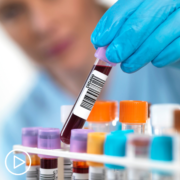Pain Outcomes Among Black Women With Early Stage Breast Cancer After Mastectomy
Pain Outcomes Among Black Women With Early Stage Breast Cancer After Mastectomy from Patient Empowerment Network on Vimeo.
What do studies show about early breast cancer after mastectomy in Black women? Expert Dr. Demetria Smith-Graziani explains research into discrimination, trust, and pain outcomes in this patient group.
Demetria Smith-Graziani, MD, MPH is an Assistant Professor in the Department of Hematology and Medical Oncology at Emory University School of Medicine. Learn more about Dr. Smith-Graziani.
Download Guide | Descargar Guía en Español
See More from [ACT]IVATED Breast Cancer
Related Resources:
|
|
|
|
Transcript:
Lisa Hatfield:
Dr. Smith, you’ve done extensive research in this area. Can you talk a little bit about your recent research investigating the association between discrimination, trust, and pain outcomes among Black women with early stage breast cancer after mastectomy?
Dr. Demetria Smith-Graziani:
Sure, so I am very passionate about racial, ethnic and socioeconomic disparities in breast cancer risk treatment and outcomes, and most recently, I’ve been doing research looking at disparities in pain outcomes, so unfortunately, it’s well-documented that Black patients as a whole and women, and then particularly Black women, often have their pain not properly assessed and then not properly treated compared to their white counterparts. So I initially looked at a study of women who were undergoing different types of breast surgery, we compared women who were either getting what we call breast-conserving surgery, which is also called a lumpectomy, compared to those who were getting their entire breast removed, mastectomy.
Compared to those who were getting both breasts removed, what they call a bilateral mastectomy, and we looked at how much pain patients had after that surgery, how long it lasted, and other factors that were associated with their pain and how they felt after surgery. Now what we found is that regardless of the type surgery Black women were reporting more severe pain compared to white women, and so that’s what prompted me to engage in my most recent research project, in which I am looking at the association between perceived discrimination in the healthcare setting, trusting one’s healthcare provider and pain outcomes, particularly the severity of pain and how much that pain interferes with one’s life for Black women after they’ve had a mastectomy surgery to remove the entire breast for the treatment of their breast cancer.
So I have recruited some patients, and I am in the process of getting ready to enroll more patients on this study, and I’m hoping to get some good information about whether or not that discrimination that people receive in the healthcare setting affects the way that…how much their pain interferes with their life and how severe their pain is, and whether part of the reason that the discrimination affects their pain is related to the amount of trust that they have in their oncologist or their oncology team. And the reason that I’m looking at that specific…the reason that I’m looking at those specific set of factors is because there are a number of psychological components to the way that we feel pain, such as anxiety, depression and yes trust that are linked to the way that we experience pain and how severe that pain is and how much that pain affects our lives.
Share Your Feedback:
Create your own user feedback survey












